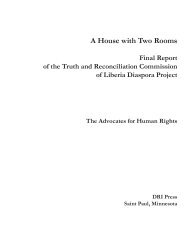Putting Liberalism in its Place, by Paul W. Kahn - Hamline University ...
Putting Liberalism in its Place, by Paul W. Kahn - Hamline University ...
Putting Liberalism in its Place, by Paul W. Kahn - Hamline University ...
Create successful ePaper yourself
Turn your PDF publications into a flip-book with our unique Google optimized e-Paper software.
WEITHMAN.DOC 8/17/2005 8:51:49 AM<br />
101] BOOK REVIEW 103<br />
mapp<strong>in</strong>g and genealogy to uncover. But the drive pithily to distill some<br />
one th<strong>in</strong>g that is allegedly central to a heterogeneous category is a drive<br />
to which <strong>Kahn</strong> sometimes gives too free a re<strong>in</strong>. Thus readers are told <strong>in</strong><br />
a s<strong>in</strong>gle sentence what “[c]ritical theory’s most basic argument” is (123)<br />
and what “the lesson of twentieth-century genocide” is. (200, emphasis<br />
added)<br />
Critical theory and genocide do not occupy much of <strong>Kahn</strong>’s<br />
attention. His precipitous reductions of them to tag-l<strong>in</strong>es might be<br />
dismissed as <strong>in</strong>nocent were they not symptomatic of two serious<br />
problems with his methods: the problem of overly hasty and selective<br />
assimilation of disparate phenomena <strong>in</strong>to large categories and the<br />
problem of false essentialism with respect to the phenomena that have<br />
been assimilated. Th<strong>in</strong>gs called “American liberalism” and “the<br />
American political experience” occupy a great deal of <strong>Kahn</strong>’s attention.<br />
It is <strong>in</strong> <strong>Kahn</strong>’s treatment of them that these two problems exact more<br />
serious costs.<br />
The fact that politics is and must be a source of ultimate mean<strong>in</strong>g<br />
for citizens, <strong>Kahn</strong> argues, is what liberalism is <strong>in</strong>adequate to.<br />
Americans, <strong>Kahn</strong> th<strong>in</strong>ks, f<strong>in</strong>d that mean<strong>in</strong>g <strong>in</strong> a particular set of political<br />
experiences. He writes:<br />
The dist<strong>in</strong>ctly American political consciousness is born <strong>in</strong> the<br />
experience of revolution as an act of popular sovereignty. This<br />
can never be seen as corrupt; it is an <strong>in</strong>exhaustible source of<br />
mean<strong>in</strong>g for the citizen and the state. (109)<br />
American political consciousness is the consciousness of politics<br />
that people who live or have lived <strong>in</strong> the United States have or had. It<br />
would not be surpris<strong>in</strong>g if Americans’ consciousness of politics, and the<br />
mean<strong>in</strong>g they f<strong>in</strong>d <strong>in</strong> politics, varied with race, gender, ethnicity, wealth,<br />
social location and condition of servitude. Perhaps there is noth<strong>in</strong>g<br />
illegitimate about gather<strong>in</strong>g the diverse political experiences of all these<br />
Americans <strong>in</strong>to a s<strong>in</strong>gle category. But it is far from obvious that there is<br />
someth<strong>in</strong>g common or essential to those experiences that can then be<br />
identified as “the dist<strong>in</strong>ctly American political consciousness” and that<br />
is connected with revolution or popular sovereignty. Certa<strong>in</strong>ly <strong>Kahn</strong><br />
provides no evidence for th<strong>in</strong>k<strong>in</strong>g that there is. And so he provides no<br />
evidence that American politics provides some one source of ultimate<br />
mean<strong>in</strong>g for which liberalism is unable to account.<br />
<strong>Liberalism</strong> <strong>its</strong>elf is a large extended family of political views.<br />
Members exhibit family resemblances. It is tempt<strong>in</strong>g to exaggerate the<br />
unity of the family and then to look to genealogy or architecture for<br />
someth<strong>in</strong>g that expla<strong>in</strong>s it. But assimilat<strong>in</strong>g members of the family <strong>in</strong>to
















